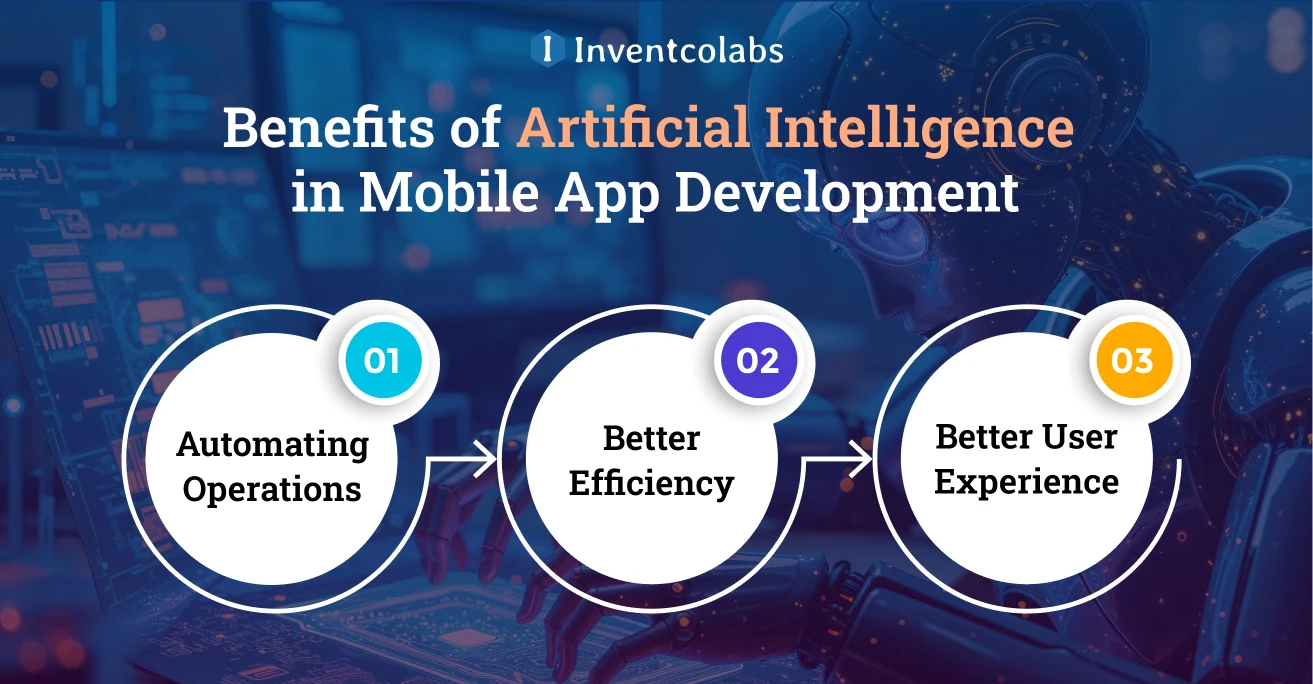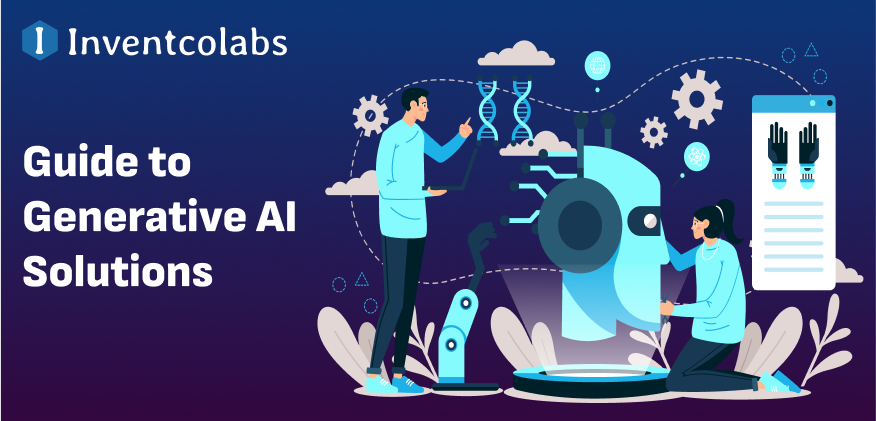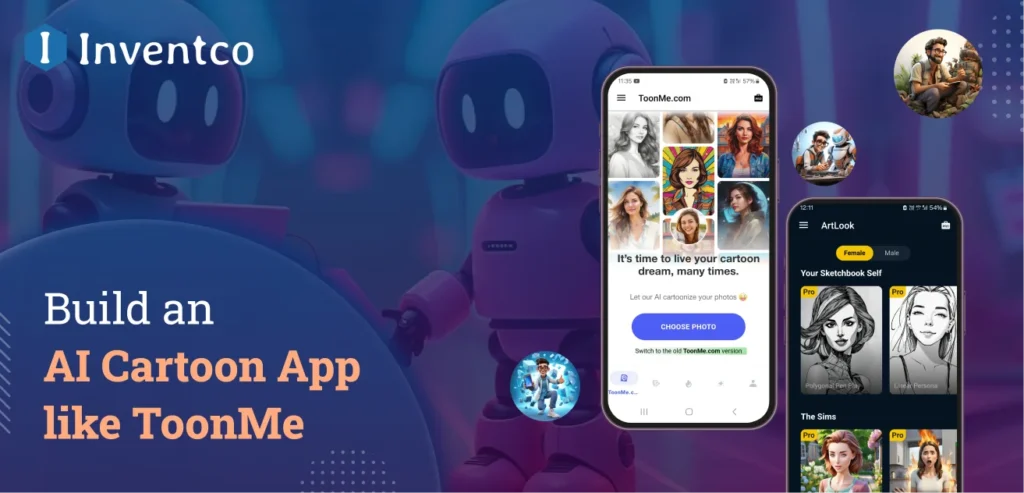Artificial intelligence has become a trending technology that has taken the industry by storm, with an increasing number of businesses adopting it. It is expected to surpass US$ 2 trillion by 2030 on the global level.
Whether it is making predictive analytics or e-learning, AI in mobile app development is what the audience looks for. It is a stand-out technology for businesses that want to empower their online applications with advanced features. In this guide, we will talk about the essential aspects of using AI in mobile app development.
What is Artificial Intelligence (AI)?
Artificial Intelligence (AI) is a trending technology that enables computers to simulate human conversations and solve user queries. It lets the machines and software learn from previous interactions and perform human-like tasks.
AI in app development uses a combination of machine learning, computer vision, and deep learning to give self-decision-making abilities to the system. In simple words, it relies on extensive datasets and computer science to make instant decisions in a more accurate manner than humans.
What is the Role of AI in Mobile App Development?
Artificial intelligence in mobile apps can be defined as the process of building mobile applications using AI technology. However, it is more than just integrating this technology into the mobile applications. There is a need for a deep understanding of the AI landscape so that appropriate tools can be selected.
An AI app development company implements specific algorithms for adding innovative features and intelligent functionality to mobile apps. This technology adds advanced capabilities in mobile apps for making quick decisions with the help of real-time data.
Additionally, it assists in leveraging the capabilities of many emerging technologies like wearable, AR/VR, blockchain, and many more. A few notable examples of AI use in mobile app development are Cortana, Alexa, Google Assistant, and Edison Assistant.
Key Applications of AI in Mobile Apps
Without any doubt, the use of AI and ML in mobile app development has turned into a game-changer for many businesses across the globe. Have a look at how this technology can work for your company’s mobile application:
1. Chat Automation
Mobile application is a competitive industry that requires an intuitive user experience and strong support from users. However, having support agents 24/7 is highly expensive for answering the user’s query.
In this situation, chatbot development can be handy for answering customer queries in mobile apps using natural language processing.
2. Digital Assistance
AI can work as a virtual assistant using voice and speech recognition technology to identify the speaker’s voice and process the needed commands. It lets the users connect with the app by performing minimal steps.
The use of artificial intelligence in mobile apps lets users issue commands and perform other tasks with their hands. Also, this technology is quite handy for people with disabilities.
3. Predictive Analytics
Whether we talk about finance or the healthcare industry, analyzing performance can be handy for gaining insights into customer behavior and making services better.
The advent of AI ensures intelligent algorithms can go through customer usage data and gain predictions that can be used to improve services in the future.
Benefits of Artificial Intelligence in Mobile App Development

Artificial intelligence has already transformed the business landscape of many industries. It creates endless opportunities across various sectors globally. Have a look at the key benefits of AI in mobile app development below:
1. Automating Operations
The mobile apps that come with AI-based features get integrated into company’s system for managing the daily operations efficiently. It minimizes the manual work and assists in automating the mundane tasks.
Also, it helps in minimizing human errors and results in top-level accuracy that has become crucial in today’s business landscape.
2. Better Efficiency
The use of this technology can lead to faster processing than a human. For example, AI in ecommerce app development optimize the stock levels and triggers alerts once the inventory gets low.
On top of that, it can adjust the prices as per the real-time demand, which can save lots of time. In short, it can work as a handy helper for increasing efficiency and improving user experience.
3. Better User Experience
Using generative AI in mobile app development offers superb assistance during user and customer interactions. It helps in giving a personalized touch to the experience.
The intelligent algorithms available in AI make sentiment analysis and define emotions that can be highly beneficial for improving services in the future.
Real-World Examples of AI in Mobile Apps
There are a great number of examples featuring the use of AI in mobile apps that have given tremendous results. Let’s have a look at some premier ones below:
1. Google Assistant
Google Assistant is an excellent example of conversational AI that is configured for generating natural human-like responses. It uses machine learning and AI to give a response to voice commands on mobile phones.
2. FaceApp
FaceApp is a highly popular photo editing app with AI technology to transform faces into photographs. It uses the power of deep learning and image recognition to perform a variety of tasks related to photo editing.
3. Spotify
Spotify is an exclusive music app that has utilized AI in mobile app development for personalizing the music recommendations of users. It comes with AI features that analyze the user’s listening and habits for curating tailor-made experiences.
What is the Future of AI in App Development?
If we talk about the future of AI in mobile app development, it is surely promising due to its ability to interact with users and boost overall functionality. It is continuously evolving and opening tons of new possibilities for mobile applications to become smarter and faster.
They can become highly personalized and intuitive with AI capabilities and anticipate user requirements for better experiences. Also, the integration of AR will become common in the near future, which will make real-time adjustments to visuals and interactions.
Conclusion
The ever-increasing use of AI in app development is revolutionizing the app development industry by making experiences quicker and personalized for mobile users. The competitive industry demands frequent transformation in how businesses interact with customers and streamline operations.
AI-powered mobile apps can create a range of opportunities, ranging from advanced analytics to highly personalized user experiences and automation. They help in enhancing customer satisfaction and minimizing the cost to a greater level.
The future is here- connect with on-demand mobile app developers to build AI-powered solutions for your company!
FAQs
Q1. How do we use AI in app development?
Ans. AI application development services work by enhancing user experience, automating tasks, and adding new features to the mobile app.
Q2. Can AI in mobile app development create a revolution?
Ans. Artificial intelligence in mobile app development has already created a revolution by transforming these applications and enhancing user experiences in tremendous ways. This technology will continue to evolve and redefine how mobile applications interact with users.
Q3. What are the main challenges of using AI in app development?
Ans. Although AI in mobile app development looks revolutionary, it comes with a certain set of challenges related to privacy, data, and performance. Also, model complexity and latency can slow down the app’s responsiveness to a greater level.
Q4. Can AI be added to existing mobile apps?
Ans. Yes, AI can be integrated into the present mobile app system to add new functionalities.
Q5. What is generative AI in mobile app development?
Ans. The generative AI is used to simplify the user interface and validate the prototype app. It works to increase the speed of the processes for designing unique codes and adding innovative features.





